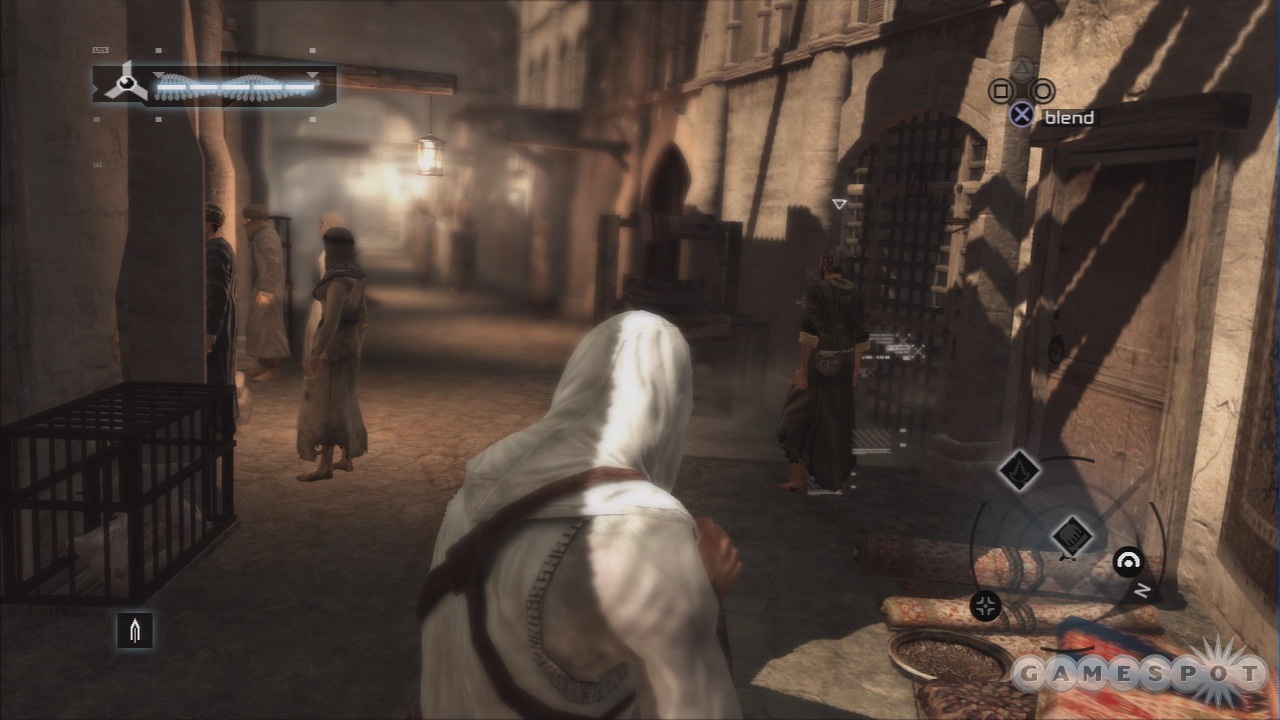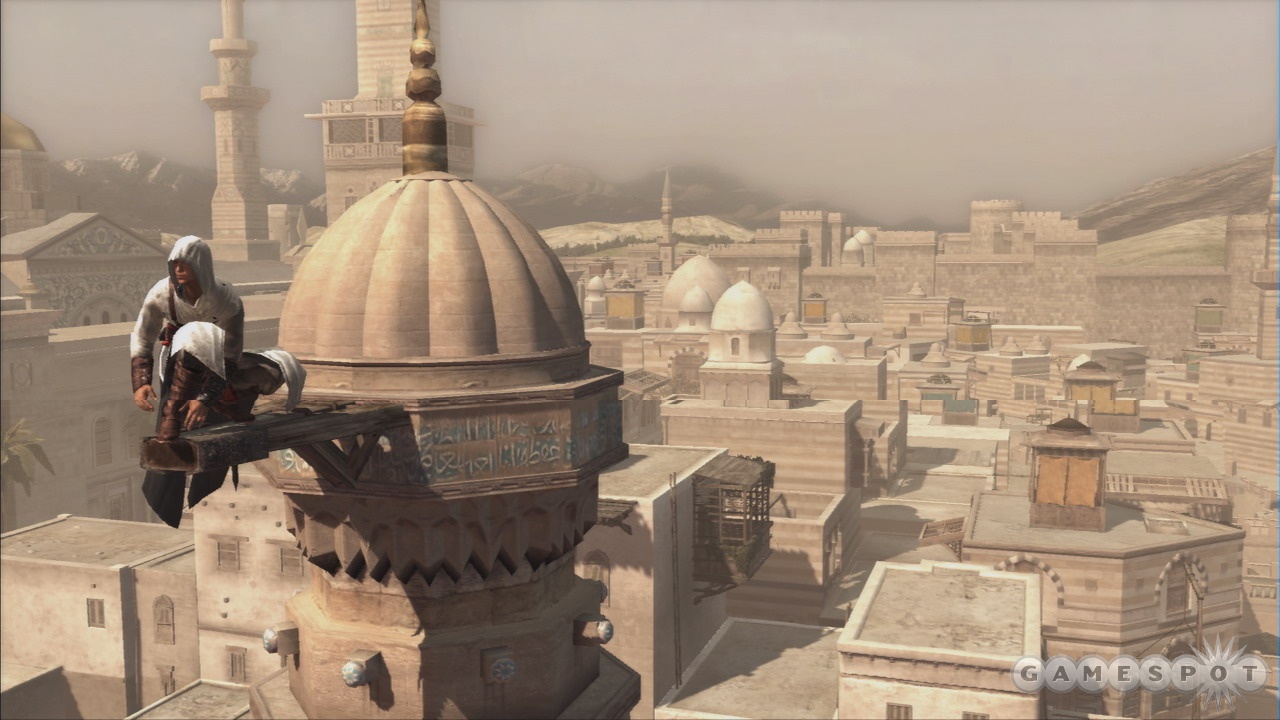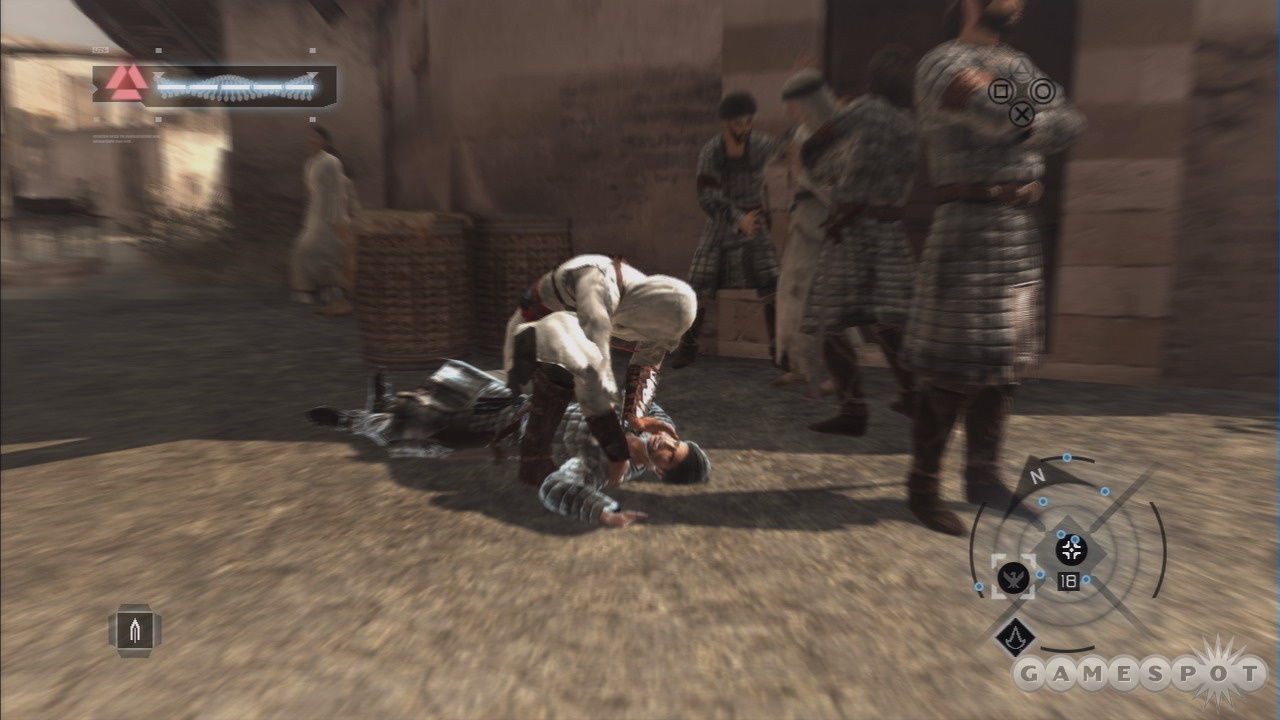Assassin's Creed will stay with you long after you finish it. Here is one of the most unique gameworlds ever created: beautiful, memorable, and alive. Every crack and crevasse is filled with gorgeous, subtle details, from astounding visual flourishes to overheard cries for help. But it's more than just a world--it's a fun and exciting action game with a ton of stuff to do and places to explore, rounded out with silky-smooth controls and a complex story that will slowly grab you the more you play. Make no mistake: Assassin's Creed is one of the best efforts of the year and a must-own game for Xbox 360 and PlayStation 3 owners.

Not enough can be said about the living, breathing world that you'll inhabit in Assassin's Creed. As assassin extraordinaire Altaïr, you'll explore three major cities of the Holy Land in the 12th century: Jerusalem, Damascus, and Acre. Each city is beautifully rendered from top to bottom and features meticulously crafted towers that reach for the sky, bustling market squares, and quiet corners where citizens converse and drunks lie in wait to accost you. As you wander the streets (and rooftops), you'll push your way through crowds of women carrying jars on their heads, hear orators shout political and religious wisdom, and watch town guards harass innocent victims. Altaïr has a profound effect on this world, but the cities are entities all their own, with their own flows and personalities.
The visual design has a lot to do with how believably organic everything feels. The cities are absolutely huge, and though you don't get full exploration privileges in the first few chapters, they eventually open up to let you travel seamlessly from one side to another. Everything is beautifully lit with just the right amount of bloom effect, and almost everything casts a shadow, from tall pillars to Altaïr's cloak. In fact, sometimes the shadows get to be a bit much and may make you think for a moment that there is artifacting on your screen, when in fact it's a character's head casting a shadow on his or her own neck. Every object, from scaffolds to pottery, is textured so finely you feel as if you could reach out and touch it. Animations are almost as equally well done. Altaïr scales walls, leaps majestically from towers, and engages in swashbuckling swordfights that would make Errol Flynn proud. And he does it all with fluid ease, generally moving from one pose to another without a hitch. Minor characters move gracefully as well, though one of the game's few visual drawbacks is the occasional jerky animation on the part of a citizen. However, it's easy to forgive, considering that the cities are populated with thousands and thousands of individuals. In fact, these tiny blemishes are noticeable only because everything else looks so incredible.
What you hear is even more impressive than what you see. At the top of a temple, you hear little but the rush of wind, the twittering of birds, and the barking of a far-off dog. In the most populated areas, your ears will fill with the din of street vendors, the pleas of beggars, and the occasional humming. It's never too much, though, and the game does a good job of making sure you hear what you need to hear (for example, the cries of citizens who need your help), without filling your ears with pointless noise. All these effects, along with the clangs of swords and groans of assassinated foes, are outstanding. The voice acting of the supporting cast is similarly remarkable. Conversations are completely believable and delivered with the perfect amount of solemn dignity. Oddly, the weakest link is Altaïr himself. Actor Philip Shahbaz does an all right job, but he isn't up to par with the first-rate acting of his fellow troupe. Rounding it all out is a beautiful orchestral score that is most notable for its subtlety. Many of the game's most impressive moments are accompanied by lovely musical themes that add even more threads to the game's rich living tapestry.

Fortunately, the story that binds it all together rises to the occasion. Actually, there are two related stories in play. The unfolding drama of Crusades-era Palestine is a mere memory, forcibly pulled from a modern-day bartender named Desmond by a resolute researcher using a machine called an animus. The memories aren't Desmond's own--they are Altaïr's, stored safely in the hapless subject's genetic code. We follow Altaïr as he assassinates nine public figures at the command of his master, and as the common thread that ties these men comes into focus, so does the true identity of Desmond's captors. There are no cutscenes in the traditional sense; every bit of story exposition and dialogue flows smoothly from the gameplay and takes place entirely within the game engine. The ending is confusing, and it blatantly leaves open the possibility of a sequel, but it's a small blemish on an otherwise stirring tale. Altaïr's world is not one of absolutes. His assassination targets aren't always evil, and Altaïr isn't always likable. As he is fond of reminding us, "Nothing is true. Everything is permitted."
Of course, such an authentic world would be meaningless without a lot of fun things to do in it. Thankfully, Assassin's Creed is endlessly entertaining in that it features a fine mix of stealthy exploration, tight platforming, and exciting combat. To discover the whereabouts of your assassination targets, you must first follow up on possible leads. There are several different mission types in this regard. In some cases, you sit on a bench and listen in on secret conversations. At other times, you will closely follow someone carrying an important letter that you'll pickpocket. Alternately, you can beat the information out of your target. Most missions are relatively easy to pull off in the early stages of the game. But once the guards and townspeople start recognizing you (or you alert them to your presence too close to the scene of one of your crimes), they get a little tougher.
There are also some optional tasks, such as rescuing innocent townspeople from the clutches of guards. The reward for doing so is a group of vigilantes who will hang out in the area afterward and hinder any foes chasing you. It's also a good way to try out Assassin's Creed's combat, which is surprisingly satisfying, considering the game's focus on sneaking around. You can pounce on enemies using your hidden blade (an incredibly rewarding one-stab kill), or use throwing daggers to take enemies down from a distance. However, your sword is your melee mainstay, and though the hack-and-slash combat may seem simple at first, it gets more challenging once you unlock the various countermoves. Often, you'll have a dozen or more attackers to fend off at once, but though these fights can be a little tricky, you'll never feel as if you're in over your head. In fact, the few circumstances in which you are forced into combat--such as a late-game boss fight against a seemingly endless crowd of attackers and their leering leader--are challenging and require some pitch-perfect timing to counter every strike and lunge.

Nevertheless, brute force is rarely the best way to handle a situation. You want to slink unnoticed through the crowds, but you can draw attention to yourself in a number of ways--whether it be galloping past a guard station on a horse, knocking pottery off of someone's head, or getting so frustrated by the various beggars that you fling them away from you. (And trust us--these are the most aggressive panhandlers you'll ever meet.) If you antagonize the guards, they'll give chase. Yes, you can stick around and fight, and though it's never the easiest option, breaking stealth does not damn you to death like it does in other sneaking games. But why not lure them to a rooftop? Once up there, you can grab them and fling them to the street below. Or if there are too many of them, you can jump across the rooftops gracefully until you find a hiding place, such as a nice bale of hay or a curtained garden. Once you're hidden, they'll break chase and you'll be free to roam about.
You can also seek refuge in small groups of scholars who serve as mobile hiding places. It's a bit contrived to walk into a stationary cluster of scholars and have them suddenly start moving simply because you're there, but it gets the job done. Actually, if there's any drawback to the usually excellent gameplay, it's how synthetic certain elements feel. Vigilantes are always in the same spot, missions reset if you don't get them right the first time, and those same guards will be harrassing that citizen, an hour after you pass by. It's easy to forgive these quirks though, given the easygoing flow of the world surrounding these pockets of gameplay.
Climbing up buildings and jumping around the rooftops is fun and breezy, thanks to effortless controls that strike a great balance between ease of use and player input. You can leap across alleys and scale walls with the pull of a trigger and the press of a button, and though it's possible to launch yourself from a wall or hurtle through a vendor's booth by accident, these moments aren't very common. You'd think that a city specifically designed to let you climb structures and caper about the roofs would look overly artificial, yet there's never a moment when you will think to yourself, "Wow, that looks like a place where I'm supposed to jump." The architecture looks completely natural, which makes Altaïr's abilities all the more exciting to pull off. The environments don't look as if they were created for him to climb around on; he just uses the hand he's been dealt, as any good assassin should.

In Assassin's Creed, the greatest joy comes from the smallest details, and for every nerve-racking battle, there's a quiet moment that cuts to the game's heart and soul. Climbing towers to uncover portions of the map is a simple mechanic but forever satisfying, thanks to the beautiful vistas and soft musical themes that accompany the view. Even the drunks that pester you are amusing and fun, though their constant shoving is more than annoying, especially if you are trying to pickpocket a pedestrian or eliminate a target without a fuss. It all makes your missions that much more compelling, and you'll be inclined to explore every nook and cranny and take on every optional task, just for the fun of it. There's a ton of stuff to do, and even when you've exhausted your official tasks, you can search for the collectible flags and crosses strewn around the cities and countryside. You could probably plow through the main quest in 20 hours if you're lucky, but completists might spend close to 50 hours finishing every quest and gathering every collectible.
There are few differences between the Xbox 360 and PlayStation 3 versions. PS3 owners are blessed with a slightly more solid frame rate, although the 360 version features a little more contrast in the lighting, so it's pretty much a wash. But regardless of which platform you go with, you'll have an amazing and unforgettable game. Assassin's Creed is the kind of game you tell your friends about, and one that should be in your collection.